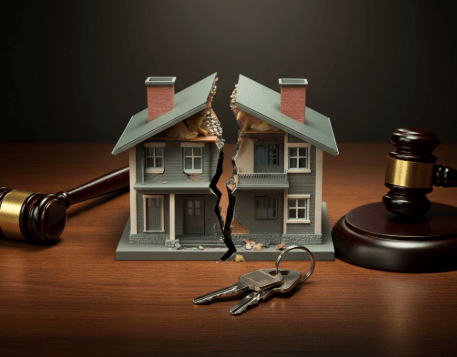Navigating a breakup is difficult, and it becomes even more complex when a shared home is involved. The question of who gets the house when unmarried couple breaks up in Punta Gorda, FL, is a common and stressful one, especially as nearly 15% of U.S. adults now live with an unmarried partner. Unlike divorcing couples, unmarried partners are not protected by marital property laws, making the situation legally complicated. In Florida, the outcome often depends entirely on how the property is titled, if there are any written agreements, and who contributed financially to the home. This process can be overwhelming, but straightforward solutions are available. For those seeking a fast, hassle-free way to resolve property disputes, Steve Daria and Joleigh are renowned real estate investors and trusted cash house buyers in Punta Gorda. They help homeowners navigate these exact challenges by providing fair cash offers, removing the need for lengthy legal battles or real estate listings. If you’re wondering who gets the house when unmarried couple breaks up in Punta Gorda, FL, you don’t have to figure it out alone. Schedule a free, no-obligation consultation with Steve and Joleigh today to discuss your options and plan your next steps.
What happens to a house when an unmarried couple breaks up in Punta Gorda, Florida?
When an unmarried couple breaks up in Punta Gorda, Florida, the process for dividing a house is very different from a divorce.
Florida does not have common-law marriage, so living together does not automatically grant you rights to property owned by your partner.
Instead, the situation is handled under property and contract law, meaning the name on the house title is the most critical factor.

If only one person’s name is on the deed, they are the legal owner, and verbal promises are very difficult to enforce.
The question of who gets the house when unmarried couple breaks up in Punta Gorda, FL, often comes down to this single document.
If both names are on the title, you’re co-owners and must decide whether one buys the other out, or if you sell the property.
In cases of disagreement, a court can order a “partition sale,” which forces the house to be sold and the proceeds divided.
For those wanting to avoid a complicated legal battle, selling the home and splitting the proceeds is often the simplest option.
It’s always wise to seek independent advice or consult a professional to understand your choices and rights fully.
Get An Offer Today, Sell In A Matter Of Days…
Can my partner kick me out of the house if my name isn’t on the title?
If your name is not on the house title or a formal lease, the legal owner generally has the right to request that you leave.
However, they may still need to follow a proper legal process, such as providing written notice, rather than simply kicking you out immediately.
Contributing to mortgage payments, bills, or home improvements does not automatically grant you ownership rights in Florida.
Because the state does not recognize common-law marriage, living together for a long time does not change your legal standing regarding the property.
Verbal promises about ownership are also tough to enforce in court.
This situation highlights the core issue of who gets the house when unmarried couple breaks up in Punta Gorda, FL, as legal title is the most important factor.
While you may have a potential claim to be reimbursed for your financial contributions through a lawsuit, it does not guarantee you can stay in the home.
The best approach is often to negotiate a reasonable move-out timeline with your former partner to avoid further conflict.
What if both our names are on the house title in Punta Gorda, Florida?
- You Are Both Legal Owners: When both names are on the title, you are both considered equal owners of the property in the eyes of the law. This means neither person can sell the house or force the other out without a formal agreement or court order.
- Understand Your Title Type: Check if you are “joint tenants with right of survivorship,” where the survivor inherits the house, or “tenants in common,” where each share can be willed to someone else. This impacts how your shares are handled during a split and afterward.
- Agree on a Solution: You have three main options: sell the house and split the profit, one partner buys out the other’s share, or one stays and pays rent to the other. A written agreement is the best way to formalize any choice and prevent future disputes.
- Split Costs and Proceeds Fairly: Until the property is sold or bought out, both parties are responsible for mortgage payments, taxes, and insurance to protect credit. Proceeds from the sale are usually split based on ownership shares after paying off the mortgage and any liens.
- Handle Disagreements with a Plan: If you cannot agree on what to do, you can use a mediator to help find a solution. If that fails, one owner can file a “partition action,” which is a lawsuit that asks a court to force the sale of the home.

I paid for the down payment and mortgage, but my name isn’t on the deed. What can I do?
This is a challenging situation, as legal ownership of property in Florida is determined by the name on the deed, not by who makes payments.
However, even if you are not listed on the title, your financial contributions may entitle you to certain rights to recover your money.
You would need to gather all possible proof of your payments, such as bank statements, canceled checks, and any written communications about the home.
Because Florida does not recognize common-law marriage and verbal agreements are difficult to enforce, this documentation is critical.
Your options could include filing a lawsuit to establish a “constructive trust” or claim “unjust enrichment” to recover the funds you invested.
This complex issue gets to the heart of who gets the house when unmarried couple breaks up in Punta Gorda, FL, showing that financial input alone doesn’t guarantee ownership.
The most direct path is to try to negotiate a buyout with your former partner, where they repay your contributions in exchange for you waiving any claims.
If you are unable to reach an agreement, it is wise to document everything and seek professional guidance to understand your legal options.
What are the risks of leaving the property division issue unresolved after a breakup in Punta Gorda, Florida?
- Damage to Your Credit Score: If one partner stops paying the mortgage on a jointly owned home, both credit scores will suffer. This can make it more difficult to obtain loans, rent an apartment, or open a new credit card.
- Future Legal and Financial Headaches: Unresolved property disputes can lead to expensive legal battles, such as a court-ordered partition sale. You also remain legally bound to your ex-partner, which can complicate future finances and relationships.
- Loss of Home Equity and Market Value: Delaying a sale could mean missing a good real estate market, resulting in thousands of dollars in lost profit. If the home falls into disrepair from neglect, its value will drop significantly.
- Unexpected Liens and Tax Problems: If a co-owner defaults on taxes or debts, a lien could be placed on the entire property, blocking its sale or refinance. This debt attaches to the house, creating a major financial obstacle for both owners.
- Ongoing Personal Stress and Conflict: Leaving the issue unresolved keeps you financially and emotionally tied to a former partner, preventing you from moving on. This lingering connection can be a constant source of stress and uncertainty for everyone involved.
We’ve decided to sell. How can we ensure the process is fair for both of us?
When you decide to sell, ensuring fairness starts with clear communication and a written agreement.
This document should outline how you’ll set the price, establish a timeline for the sale, and detail how you will split expenses, such as repairs or closing costs.
Using a neutral third-party title company for the closing is essential, as they will handle the funds and ensure the mortgage and any liens are paid before distributing the remaining money according to your agreement.
Keeping all offers, counteroffers, and decisions in writing prevents misunderstandings and provides a clear record for both parties.
This formal approach moves beyond the emotional question of who gets the house when unmarried couple breaks up in Punta Gorda, FL, and into a structured business transaction.
For those who want to bypass the stress of a traditional sale, working with an expert real estate investor can simplify the process.
Steve Daria and Joleigh are seasoned cash house buyers in Punta Gorda, providing a fast and transparent process with no need for repairs or showings.
To explore a straightforward and fair cash offer for your property, book a free, no-obligation discussion with them today.
Takeaways
- Prioritize Documentation Over Assumptions: When splitting property in Punta Gorda, clear evidence is what matters, not fairness. Remember, the name on the title holds the legal power. Without a written agreement, your financial contributions might not guarantee you a share of the home.
- Prevention is the Best Solution: The easiest way to handle a property dispute is to prevent it. Creating a simple cohabitation or property agreement when buying a home together is the best way to protect both partners from future conflict and costly legal battles.
- Your Contributions Still Have Value: Even if you’re not on the deed, money put towards a down payment, mortgage, or significant improvements isn’t necessarily lost. Keep detailed records; they can form the basis of a legal claim for reimbursement.
- Cooperation Beats Litigation: Exhaust all options before a costly partition lawsuit. Negotiated buyouts or agreed sales typically offer faster, cheaper, less stressful results for all parties.
- Inaction Creates the Biggest Risk: Putting off decisions about a shared property after a breakup can hurt your credit and financial future. To make a clean break, you need to act quickly by either selling the home or creating a new ownership agreement.
**NOTICE: Please note that the content presented in this post is intended solely for informational and educational purposes. It should not be construed as legal or financial advice or relied upon as a replacement for consultation with a qualified attorney or CPA. For specific guidance on legal or financial matters, readers are encouraged to seek professional assistance from an attorney, CPA, or other appropriate professional regarding the subject matter.

